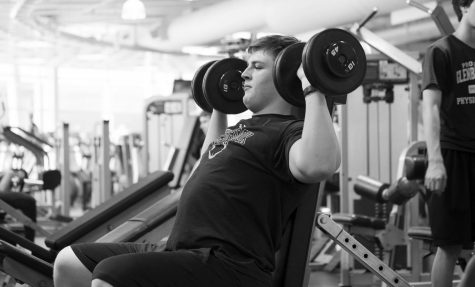Dietitians advise caution in supplement use

Face red, a single droplet of sweat rolls down his already moist forehead. Junior Nick Mantas stares himself down in the mirror, ready to take on his next lift: shoulder presses. Mantas raises each 45 lb. weight to shoulder height and inhales as he brings them down to the starting position, focusing on maintaining perfect form with quick repetitions. At the end of the set, the dumbbells slam to the ground. Mantas takes a deep breath, then refocuses. His eyebrows furrow into a sterner scowl as he heads to do step-ups. After his workout each weekday, Mantas likes to use a whey protein powder supplement.
“I take [whey protein] for muscle recovery and to build more muscle, because the next day if I don’t take it, I’ll usually end up sore, but if I take it I’ll be ready to go,” said Mantas. “I [mix the] powder and a banana, … so it usually tastes really good.”
Supplements are isolated nutrients which are claimed to have health benefits, according to Registered Dietitian Andrea Rudser-Rusin.
“[Supplements] can fill the gaps where a diet might be lacking,” Rudser-Rusin said.
Supplements come in powder, pill and liquid forms. According to pediatrician Charles O’Brien, athletes may take supplements to improve athletic ability, but the American Academy of Pediatrics warns against using some supplements.
Since supplements are regulated differently than food and drugs, Melanie Battaglia, registered dietitian and nutritionist, said there are safety concerns associated with using them.
“It’s up to the manufacturer and company that makes the supplement to make it safe, so just because [there are ingredients] on the label, we don’t know what’s in it [and] the effects of it,” said Battaglia. “We don’t know if it’s safe.”
Rudser-Rusin said creatine, a powder supplement, is an “explosive fuel source” and can be dangerous for student-athletes to take. Since supplements are not regulated by the United States Food and Drug Administration, creatine may be contaminated with possibly harmful substances.
According to O’Brien, while taking creatine supplements helps with muscle growth, it can cause dehydration and kidney problems.
Another commonly used supplement, whey protein, is taken to help build muscle, according to Rudser-Rusin. She believes it is not any more beneficial than protein coming from food.
“One gram of protein is still four calories, so people forget that you’re also putting calories in the body,” said Rudser-Rusin. “What’s not used is not just peed out. What’s not used is then converted and stored as fat.”
Instead of taking protein supplements, Battaglia said a better alternative is getting nutrients from food sources.
“Four ounces of chicken has 35 grams of protein,” said Battaglia. “If you compare that to one scoop of whey protein, it has protein, but the chicken has 35 grams of protein plus vitamins and nutrients that you can use to recover and perform well in your sport.”
Mantas said he started taking a whey protein supplement after speaking with his coaches and doctors.
“It’s easier this way, because [I] don’t have to cook anything, and it’s cheaper,” said Mantas. “[I] just get the whey instead of a whole meal.”
Sean Brandt, instructional assistant for the P.E. department, said he does not recommend that students depend on supplements. However, he periodically uses branched-chain amino acid supplements to accelerate recovery and reduce soreness.
“Last week I abstained [from supplements], and I was really sore,” said Brandt. “It took me a while to get going in workouts … [as] opposed to this week, I put a little in my water bottle when I [was] working out, and it seems like [I was] recovering quicker, [and was] able to work out and push a little harder.”
Justin Weiner, football running backs and defensive backs coach, said once students are 18 years old, he believes they can choose to take supplements.
“When you’re of an adult age and your body is done growing, you can make that determination if you should take [supplements] or not,” Weiner said.
For students who decide to use supplements, Battaglia said she recommends researching and seeking professional advice.
“Go to a dietitian, and they’ll go through what you’re eating and see if you are missing any nutrients,” said Battaglia. “They’ll look at the product you’re interested in and make sure it is safe.”
Weiner said he provides his team with a packet of nutritional information because he understands they want to grow stronger, and he wants them to do so in the best and safest way possible.
“The kids always laugh when I tell them this, but the saying I always use is, ‘Feed the Ferrari,’” said Weiner. “If you want to be a Ferrari, you can’t feed it unleaded fuel. It needs premium fuel. … If I want to be an optimal athlete, if I want to be in the best shape, I have to feed myself the right way, and [I am] not going to get that from supplements.”

